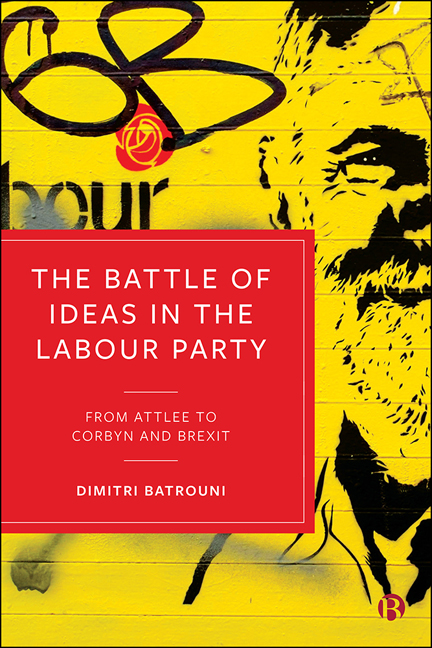Book contents
- Frontmatter
- Contents
- List of Abbreviations
- Acknowledgements
- Introduction
- 1 The Battle of Ideas in the Labour Party, 1945–92
- 2 The Rise of New Labour: Electoral Concerns Trump Ideology
- 3 Bridging the Divide: Ed Miliband and Ideas
- 4 Pre-distribution
- 5 Corbynism: The Left’s Resurgence
- 6 Corbynism: Brexit and Globalization
- References
- Index
1 - The Battle of Ideas in the Labour Party, 1945–92
Published online by Cambridge University Press: 10 March 2021
- Frontmatter
- Contents
- List of Abbreviations
- Acknowledgements
- Introduction
- 1 The Battle of Ideas in the Labour Party, 1945–92
- 2 The Rise of New Labour: Electoral Concerns Trump Ideology
- 3 Bridging the Divide: Ed Miliband and Ideas
- 4 Pre-distribution
- 5 Corbynism: The Left’s Resurgence
- 6 Corbynism: Brexit and Globalization
- References
- Index
Summary
This chapter examines the historical battles of ideas in the Labour Party, focusing on the major disputes between 1945 and 1992. Given the scope of the time period, this analysis will briefly cover the totemic battles. It will highlight the background to the disputes, the main protagonists involved and, of course, the ideas utilized in those debates. The breadth of this chapter necessitates a brevity to the number of key battles analyzed and the level of detail provided, but the four key time periods and battles that are covered provide important context to the continuing battle in the party. The four main periods covered are:
the 1945 Attlee government – liberal ideas
Crosland, revisionism and Bevanism
1970s socialism – the AES
Neil Kinnock and the fightback of the right
All of these periods demonstrate the age-old battle between what are normally termed the left and right wings of the Labour Party. This battle has covered many policy areas and can focus on quite arcane – although important – philosophical definitions of what is ‘socialism’ and what constitutes ‘socialist’ policies. For the most part, this debate will be avoided; however, some discussion on this subject is inevitable. These four periods do not represent all the pivotal moments, but they do give a robust flavour of previous battles and how the debate over ideas has changed, or not, over time. Indeed, they provide a coherent, consequentially ordered timeline of the never-ending battle of ideas in the party. The first stop is the most vaunted of all Labour governments.
The 1945 Attlee government: liberal ideas
The Labour Party winning the general election in 1945 was mainly due to the outbreak of the Second World War in 1939. War encouraged the formation of a national government (a government made up of all the parties) which provided vital governmental experience to senior Labour leaders, allowed the Conservatives to be blamed for the outbreak of the war, and instilled into the British public's mind the principal and benefits of collectivism in pursuit of a common cause; in this case the war effort. Moreover, for the Labour Party, it is also encouraged a process where the ideas of the left and right of the party fused together to form a formidable policy platform.
- Type
- Chapter
- Information
- The Battle of Ideas in the Labour PartyFrom Attlee to Corbyn and Brexit, pp. 11 - 40Publisher: Bristol University PressPrint publication year: 2020



